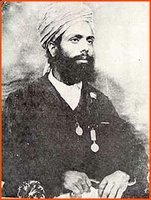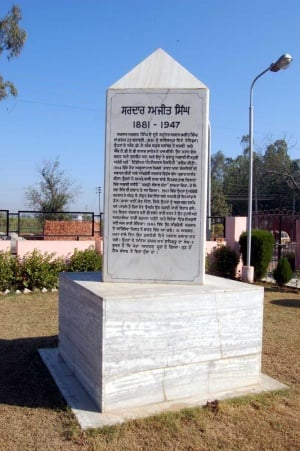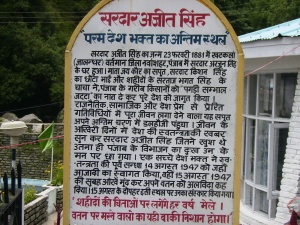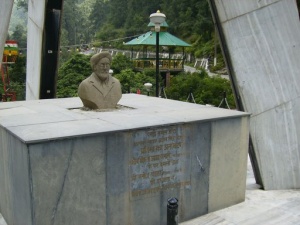Sardar Ajit Singh: Difference between revisions
Allenwalla (talk | contribs) mNo edit summary |
mNo edit summary |
||
| Line 19: | Line 19: | ||
A samadhi in his memory is at Panjpula, a popular and scenic picnic spot in Dalhousie. Perhaps less well known than Bose, and not featured in films like his famous nephew Sardar Bhagat Singh, he was never-the-less a leading figure in the cause of India's independance. | A samadhi in his memory is at Panjpula, a popular and scenic picnic spot in Dalhousie. Perhaps less well known than Bose, and not featured in films like his famous nephew Sardar Bhagat Singh, he was never-the-less a leading figure in the cause of India's independance. | ||
== Ajit Singh == | |||
(1881-1947), patriot and revolutionary, was born in February 1881 at Khatkar Kalari, in Jalandhar district of the Punjab, the son of Arjan Singh and Jai Kaur. He had his early education in his village and then at Sain Dass Anglo Sanskrit High School, Jalandhar, and D.A.V. College, Lahore. He later joined the Bareilly College to study law, but left without completing the course owing to ill health. He became a munshi or teacher of Oriental languages, establishing himself at Lahore. In 1903, he was married to Harnam Kaur, daugher of Dhanpat Rai, a pleader of Kasur. Ajit Singh came into the political arena in the agrarian agitation in the Punjab in 1906-07. The passing of the Punjab Land Colonization Bill (1906) and enhancement in the rates of land revenue and irrigation tax had created widespread discontent in the rural areas. | |||
The Colonization Bill aimed at stopping further fragmentation of land holdings in the Chenab Colony mostly inhabited by Sikh ex-soldiers by introducing the law of primogeniture (primogeniture long the practice of British Royals, passed everything from father to eldest son). This, and some other clauses of the Bill, caused great resentment among the cultivators, who regarded it as unjustified interference with their traditional rights insofar as they related to the division of property. Popular feelings were further aroused by the prosecution, in 1907, of the editor of the Punjabee, an English language bi-weekly which often published anti-government views. In this climate of social unrest and of anti British sentiment, Ajit Singh supported the setting up in 1907 of a revolutionary organization, Bharat Mata Society, with headquarters at Lahore. A large number of protest meetings and demonstrations against the Colonization Bill were held not only in villages but also in important cities such as Rawalpindi, Gujranwala, Multan, Lahore and Amritsar. Many of these were addressed by Ajit Singh who had become a virulent critic of the government. | |||
Besides referring to the immediate problems the peasantry faced, he exhorted the people to strive for the freedom of the country and work to end foreign rule. On the recommendation of the Punjab Government, the Government of India deported Ajit Singh to Mandalay on 2 June 1907. Upon his release in November 1907, Ajit Singh returned to the Punjab amid much popular acclaim. He did not wait long to resume his anti-British activities. He launched a newspaper, the Peshwa, with Sufi Amba Prasad as its editor. He also brought out a series of tracts and pamphlets, such as Baghi Masiha, Muhibbani Watan, Bandar Bant and Ungali Pakarte Pan/a Pakara, attacking British rule in India. | |||
Fearing prosecution for an article in the Peshwa, Ajit Singh, along with Zia ul Haq, escaped to Persia in 1909. There he continued to work for India`s freedom and succeeded in building up a small revolutionary centre at Shiraz. In May 1910, he and his associates started, in Persian, a revolutionary journal, the Hayat. In September 1910, he shifted to Bushire, with a view to establishing contact with his comrades in India through Indian traders and seamen. His activities alarmed the British government. Considering further residence in Iran unsafe, Ajit Singh proceeded to Turkey via Russia where he met Mustafa Kamal Pasha, Turkish general and statesman wh, better known as Atta Turk, became the father of modern Turkey. | |||
From Turkey he went to Paris and met Indian revolutionaries. Later he shifted to Switzerland where he made the acquaintance of Lala Har Dayal and revolutionaries from other parts of the world; South America, Germany, Italy, Poland, Russia, Egypt and Morocco. Here he also met the Italian leader and future dictator, Mussolini and the famous Russian revolutionist, Trotsky. Towards the end of 1913, he shifted to France which he left soon after the outbreak of World War I, to go to Brazil where he remained from 1914 to 1932. From Brazil it was easier for him to be in touch with the leaders of the Ghadr Party in the United States. He also formed a society of Indians settled in Brazil to make them aware of their duty towards their mother country and also to raise funds to support India`s struggle for freedom. From 1932 to 1938, Ajit Singh worked in France, Switzerland and Germany. He renewed his contacts with the Indian revolutionaries working in Europe. He also met Subhas Chandra Bose. He wanted to return to India where, he thought, he could work more effectively for the cause dear to his heart. But the government, viewing him as a "dangerous agitator" and an "undesirable foreigner" (he having secured Brazilian citizenship) , did not allow his entry into the country. | |||
On the eve of World War II, Ajit Singh shifted to Italy where, in order to intensify his activities and mobilize Italian public and government support in favour of India, he formed Friends of India Society. During his stay in Italy he formed a revolutionary army of the Indian prisoners of war. His passionate speeches in Hindustani from Rome Radio and his own example of sacrifice and suffering for the country made a deep impact on the Indian soldiers. After the fall of Italy, Ajit Singh was imprisoned and kept in an Italian jail and later, when the Germans surrendered, he was shifted to a jail in Germany. Hard life in military camps took a toll upon his health. After the formation of the Interim government in the country under Jawaharlal Nehru, Ajit Singh returned to India via London. | |||
[edit] 1 The day the Nation was born one of its Greatest Patriots died | |||
On 8 March 1847, he reached Karachi and then came to Delhi where the great wanderer was given a warm welcome by his countrymen. In Delhi, he was the guest of Jawaharlal Nehru, and he participated in the Asian Relations Conference which was then in session in Delhi. Ajit Singh died at Dalhousie on 15 August 1947 the day India became an independent nation. | |||
==References== | ==References== | ||
1. Ganda Singh, ed., History of the Freedom Movement in the Panjab, vol. IV (Deportation of La/a Lajpat Rai and SardarAjit Singh). Patiala, 1978 | |||
2. Pardaman Singh and Joginder Singh Dhanki, ed., Bun`ed Alive. Chandigarh, 1984 | |||
3. Mohan, Kamlesh, Militant Nationalism in the Punjab 1919-1935. Delhi, 1985 | |||
4. Puri, Harish K., Ghadar Movement. Amritsar, 1983 | |||
5. Deol, Gurdev Singh, Shahid Ajit Singh. Patiala, 1973 | |||
6. Jagjit Singh, Ghadar Parti Lahir. Delhi, 1979 | |||
7. Yadav 1992, p. 29 | |||
8. ^ a b c Yadav 1992, p. 30 | |||
* Yadav, B.D (1992), M.P.T. Acharya, Reminiscences of an Indian Revolutionary, Anmol Publications Pvt ltd, ISBN 8170414709. | * Yadav, B.D (1992), M.P.T. Acharya, Reminiscences of an Indian Revolutionary, Anmol Publications Pvt ltd, ISBN 8170414709. | ||
Revision as of 22:12, 28 August 2008
Sardar Ajit Singh Sindhu was born in a military family from Punjab in India. His Grandfather was Sardar Fateh Singh Sinhu. Ajit Singh was one of the first men in the Punjab to openly resent the high-handedness of the British rulers openly criticize the government. Even as a child he questioned the Salaaming (bowing in courtesy) that his elder grandfather did to younger British Sahibs (masters) who he thought were ill mannered and to stupid to bother to speak Punjabi any better than a child.
He was declared a political rebel deported to Mandalay for a while and spent much of his adult life as an Indian expatriot traveling the world. He was in Naples when WWII broke out where he was asked to teach Persian at a University in Naples. He also gave a number of speeches in Hindustani, broadcasting to Indian soldiers serving in the British Army in North Africa. His speeches were aimed at raising an Azad Hind Fauj to fight against the British in India.
His elder brother was Sardar Kishen Singh Sinhu the father of Sardar Bhagat Singh.
He was born at Khatkarkalan village in Jalandhar District taking his early education at the village school. He matriculated from his uncle's middle school at Jullundur then studied at D.A.V. College, Lahore and later on at the Law College, at Barreily. But, during his first year of law his chilhood dislike of the British ruling Punjab grew and he plunged into the freedom movement, heart and soul, leaving his law studies behind. Attending the Darbar of Lord Kurzon in 1903 he sought to organize the Princes or Maharajas of the Princely states to unite against the British. Towards the aim of fully understanding the minds of his adversaries he started giving lessons in Urdu and Panjabi, many British officers became his students. In 1906 he attended the Congress session in Kalkutta with the idea of replacing the Congress and changing its path. After Kalkutta he returned to the Punjab and formed, along wih his elder brother, Sardar Kishen Singh and Ghasita Ram the Bharat Mata Society to arouse public feelings and launch a campaign of agitation against British rule in India in the Punjab. They sought to enlist the assistance of Lajpat Rai, but he considered the idea rash going so far as to call Ajit Singh a hothead.
In 1907, after giving one too many speeches in which the crowds grew unruly and threatened British citizens and businesses (it was the 50th anniversary of the Sepoi Mutiny and the British were growing very fearfull of their small numbers). After Lajput Rai was arreasted he learned that a warrant was out for his arrest, as well. Trying not to raise unrest any further he volunteered himself for arrest telling the British when and where he would be walking alone. He was deported to Mandalay Jail in Burma along with Lala Lajpat Rai. After this on November 11th he returned to the Punjab. In 1908 he left the Punjab traveling to Iran, which had developed as a centre for revolutionary activities by groups led by Sardar Ajit Singh and Sufi Amba Prasad who had worked there since 1909. The recruits to these groups included young nationalists of the likes of Rhishikesh Letha, Zia-ul-Haq and Thakur Das. By 1910, the activities of these groups and their publication, the Hayat, had been noticed by British intelligence. Reports as early as 1910 indicated German efforts to unite Turkey and Persia and proceed to Afghanistan to threaten British India. However, Ajit Singh's departure in 1911 brought the Indian revolutionary activities to a grinding halt, while British representations to Persia successfully curbed whatever activity that remained in the country. From there, he traveled to Rome, Geneva, Paris, and Rio de Janeiro.
In 1918, he came in close contact with the Ghadar Party in San Francisco. In 1939, he returned to Europe and later on broadcastted rebellion to Indian troops in Africa and worked to raise troops from captured Indian soldiers emprisoned in Italy. He advised Netaji Subhas Chandra Bose to learn to speak Hindostani as he had only been able to enlist 25 members in the Berlin Azad Hind Fauj where he and his partners in Italy had raised more than 10,000.
At the end of the war he was imprisoned by the British who intended to see that he was punished for his work on behalf of the Axis powers. Turned over at one time to the care of an American camp he shared the facts of why he had worked against the British in the war and was promtly freed and sent on his way by an American officer who had considered him a patriot like those who had worked to win America's freedom from British rule. But the British were quick to arrest him again. After suffering from imprisonment in bad, often cold, damp conditions with little food or medical treatment (one time, he thought that he was purposely mis-diagnosed with tubeculosis and then forced to sleep between two very ill tuberculosis patients. Eventually released he finally made it to Britain and the good care of his well wishers and admirers.
In 1946, he came back to India at the invitation of Pandit Jawaharlal Nehru. After spending some time in Delhi, he came to Dalhousie. There in poor health, he Ironically, breathed his last breath, on the very day that India got its Independence--the cause for which he had laboured his whole adult life.
On August 15, 1947 His last words were, "Thank God, my mission is fulfilled."
A samadhi in his memory is at Panjpula, a popular and scenic picnic spot in Dalhousie. Perhaps less well known than Bose, and not featured in films like his famous nephew Sardar Bhagat Singh, he was never-the-less a leading figure in the cause of India's independance.
Ajit Singh
(1881-1947), patriot and revolutionary, was born in February 1881 at Khatkar Kalari, in Jalandhar district of the Punjab, the son of Arjan Singh and Jai Kaur. He had his early education in his village and then at Sain Dass Anglo Sanskrit High School, Jalandhar, and D.A.V. College, Lahore. He later joined the Bareilly College to study law, but left without completing the course owing to ill health. He became a munshi or teacher of Oriental languages, establishing himself at Lahore. In 1903, he was married to Harnam Kaur, daugher of Dhanpat Rai, a pleader of Kasur. Ajit Singh came into the political arena in the agrarian agitation in the Punjab in 1906-07. The passing of the Punjab Land Colonization Bill (1906) and enhancement in the rates of land revenue and irrigation tax had created widespread discontent in the rural areas.
The Colonization Bill aimed at stopping further fragmentation of land holdings in the Chenab Colony mostly inhabited by Sikh ex-soldiers by introducing the law of primogeniture (primogeniture long the practice of British Royals, passed everything from father to eldest son). This, and some other clauses of the Bill, caused great resentment among the cultivators, who regarded it as unjustified interference with their traditional rights insofar as they related to the division of property. Popular feelings were further aroused by the prosecution, in 1907, of the editor of the Punjabee, an English language bi-weekly which often published anti-government views. In this climate of social unrest and of anti British sentiment, Ajit Singh supported the setting up in 1907 of a revolutionary organization, Bharat Mata Society, with headquarters at Lahore. A large number of protest meetings and demonstrations against the Colonization Bill were held not only in villages but also in important cities such as Rawalpindi, Gujranwala, Multan, Lahore and Amritsar. Many of these were addressed by Ajit Singh who had become a virulent critic of the government.
Besides referring to the immediate problems the peasantry faced, he exhorted the people to strive for the freedom of the country and work to end foreign rule. On the recommendation of the Punjab Government, the Government of India deported Ajit Singh to Mandalay on 2 June 1907. Upon his release in November 1907, Ajit Singh returned to the Punjab amid much popular acclaim. He did not wait long to resume his anti-British activities. He launched a newspaper, the Peshwa, with Sufi Amba Prasad as its editor. He also brought out a series of tracts and pamphlets, such as Baghi Masiha, Muhibbani Watan, Bandar Bant and Ungali Pakarte Pan/a Pakara, attacking British rule in India.
Fearing prosecution for an article in the Peshwa, Ajit Singh, along with Zia ul Haq, escaped to Persia in 1909. There he continued to work for India`s freedom and succeeded in building up a small revolutionary centre at Shiraz. In May 1910, he and his associates started, in Persian, a revolutionary journal, the Hayat. In September 1910, he shifted to Bushire, with a view to establishing contact with his comrades in India through Indian traders and seamen. His activities alarmed the British government. Considering further residence in Iran unsafe, Ajit Singh proceeded to Turkey via Russia where he met Mustafa Kamal Pasha, Turkish general and statesman wh, better known as Atta Turk, became the father of modern Turkey.
From Turkey he went to Paris and met Indian revolutionaries. Later he shifted to Switzerland where he made the acquaintance of Lala Har Dayal and revolutionaries from other parts of the world; South America, Germany, Italy, Poland, Russia, Egypt and Morocco. Here he also met the Italian leader and future dictator, Mussolini and the famous Russian revolutionist, Trotsky. Towards the end of 1913, he shifted to France which he left soon after the outbreak of World War I, to go to Brazil where he remained from 1914 to 1932. From Brazil it was easier for him to be in touch with the leaders of the Ghadr Party in the United States. He also formed a society of Indians settled in Brazil to make them aware of their duty towards their mother country and also to raise funds to support India`s struggle for freedom. From 1932 to 1938, Ajit Singh worked in France, Switzerland and Germany. He renewed his contacts with the Indian revolutionaries working in Europe. He also met Subhas Chandra Bose. He wanted to return to India where, he thought, he could work more effectively for the cause dear to his heart. But the government, viewing him as a "dangerous agitator" and an "undesirable foreigner" (he having secured Brazilian citizenship) , did not allow his entry into the country.
On the eve of World War II, Ajit Singh shifted to Italy where, in order to intensify his activities and mobilize Italian public and government support in favour of India, he formed Friends of India Society. During his stay in Italy he formed a revolutionary army of the Indian prisoners of war. His passionate speeches in Hindustani from Rome Radio and his own example of sacrifice and suffering for the country made a deep impact on the Indian soldiers. After the fall of Italy, Ajit Singh was imprisoned and kept in an Italian jail and later, when the Germans surrendered, he was shifted to a jail in Germany. Hard life in military camps took a toll upon his health. After the formation of the Interim government in the country under Jawaharlal Nehru, Ajit Singh returned to India via London.
[edit] 1 The day the Nation was born one of its Greatest Patriots died On 8 March 1847, he reached Karachi and then came to Delhi where the great wanderer was given a warm welcome by his countrymen. In Delhi, he was the guest of Jawaharlal Nehru, and he participated in the Asian Relations Conference which was then in session in Delhi. Ajit Singh died at Dalhousie on 15 August 1947 the day India became an independent nation.
References
1. Ganda Singh, ed., History of the Freedom Movement in the Panjab, vol. IV (Deportation of La/a Lajpat Rai and SardarAjit Singh). Patiala, 1978
2. Pardaman Singh and Joginder Singh Dhanki, ed., Bun`ed Alive. Chandigarh, 1984
3. Mohan, Kamlesh, Militant Nationalism in the Punjab 1919-1935. Delhi, 1985
4. Puri, Harish K., Ghadar Movement. Amritsar, 1983
5. Deol, Gurdev Singh, Shahid Ajit Singh. Patiala, 1973
6. Jagjit Singh, Ghadar Parti Lahir. Delhi, 1979
7. Yadav 1992, p. 29
8. ^ a b c Yadav 1992, p. 30
- Yadav, B.D (1992), M.P.T. Acharya, Reminiscences of an Indian Revolutionary, Anmol Publications Pvt ltd, ISBN 8170414709.




